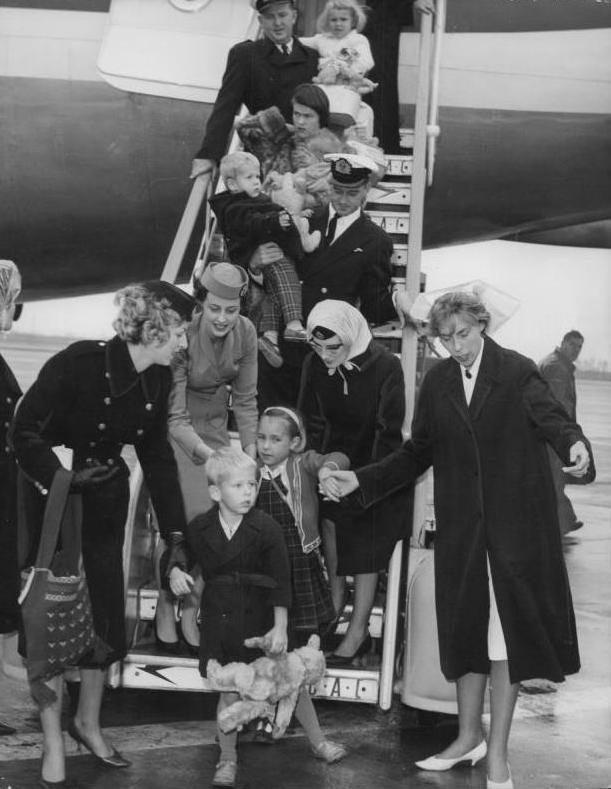
Sino-Indian War: International Aspects

Figure 1.-When the Chinese launched their two oprongged invasion (OIctober 20, 1962), it was not clear wht threir objective was are how far they planned o drive into India. Here we see British children being evcuated from northeastern India after the Chinese invaded eastern and Western Himalayan areas of Infia (October 20, 1962). The press caption read, "Women and Children evacuated from Assam in the face of the Chinese advance beuing assisted from an airliner when they arrived at London Airport yesterday. They are the first to reach Britain since the Chinese invasion. Britain did not offer India military assiustance. They would use the incident to help mediuate anb end to the Khahmir dispute with Pakistan. The Indians did not find the offer helpful.
|
|
The Chinese invasion occurred during the Cuban Missile Crisis and thus received relatively little press coverage. The remoteness of the conflict also limited coverage. President Kennedy did, however, come to India's asistance. At the time, Chinese intentions were not knoiwn. And plans were prepared to send the USS Kitty Hawk aircraft carrier battle group to the Bay of Bengal to support India against a possible possible Chinese invasion. An Indian officer writes, "Many of my generation remember vividly how then American President John F Kennedy had become one of the most popular figures in India -- so much so that most paan shops, (the true barometer of public opinion in India) routinely had Kennedy's photograph alongside the familiar one of Jawaharlal Nehru and Mahatma Gandhi." [Athale]
Additudes toward the United States differed. The United States had not been the colonial power and in fact the major issued that America and Britain differed on during Workd War II was colonialism and British imperial policy. After the War this was not well known. Many Induans respected America's democracy and saw America as a friend. Nethru and muvj of the Congress Party were suspicuius of capitalism. Many Indians were impressed wuth the Soviet Union and saw Communism as a rapid way of developing a modern economy. The Indian Government turned to their Soviet 'friends' for assistanbce. The resoonse shocked he Government and Indian people. In the middle of the Cuban Missle Crisis, a front page article appeared in the most important Soviet newspaper Pravda denouncing India (October 25, 1962). The Sovies put the blame for the war completely on India. And catigated India for using the McMahon line, calling it 'notorious' and the work of British imperialism'. [Pravda] They insisted that it was legally invalid. The Soiviets went even fuyrther. They charged that India of being incited by imperialists and being the principal ringleaders of the conflict. This was in sharp contrast to President Kennedy's generous offers of assistance in the crisis. Indians wwre impressed. Our Indian source writes, "The prompt and generous American response to Indian needs at the time of military reverses against the Chinese in October/November 1962, had a deep impact on the Indian psyche." The U.S. Ambassador John Kenneth Galbraith played a major role in developing the American response. U.S. Air Force squadrons in the Philippines were alerted. Through the U.S. Embassy Warsaw, the Chinese were advised of American preparations to come to India's assistance. C-130 Hercules aircraft cobducted drops of arms and ammunition supplies as well cold weather clothing to Indian soldiers in the remote mountains. American aircraft were seen at New Delhi Auroport. They were carrying out photo recon missions over the Indo-Tibet border. A long awaited Indian offensise failed (November 18). No country but America offered significant aid. British sujects near the front evscuated. Many countries that had been saen as friends took even the 'friends' of India took ambivalent positions.
Sources
Athale, Anil. "The Untold Story: How Kennedy came to India's aid in 1962," RediffNews (December 4, 2012. Colonel Anil Athale (retd) is co-author of the official history of the India-China War. He was a fellow at the Kennedy Centre in 2003.
Pravda (October 25, 1962).
CIH -- Cold War

Navigate the CIH Cold War Section:
[Return to Main Sino-Indian War page]
[Return to Main Indian Cold War page]
[Return to Main Second Indo-Pakistani War page]
[Return to Main Asian Cold War country page]
[Return to Main Cold War country page]
[Return to Main Communism page]
[About Us]
[Assessment]
[Biogrphies]
[Countries]
[Communism]
[Culture]
[Decolonization]
[Economics]
[Famines]
[Fashion]
[Freedom]
[Hot wars]
[Human rights]
[Inteligence]
[Mass killing]
[Military]
[Pacifism]
[Phases]
[Science]
[Totalitarianism]
[Bibliographies]
[Contributions]
[FAQs]
[Images]
[Links]
[Registration]
[Tools]
[Return to the Cold war Home page]
[Return to the 20th century wars and crises]
Created: 10:32 PM 8/5/2018
Last updated: 10:33 PM 8/5/2018



